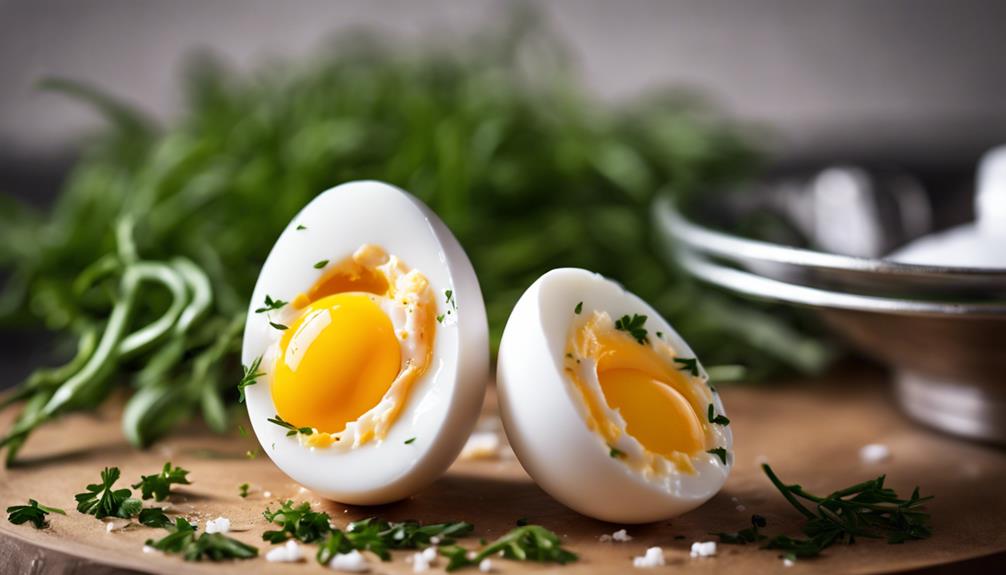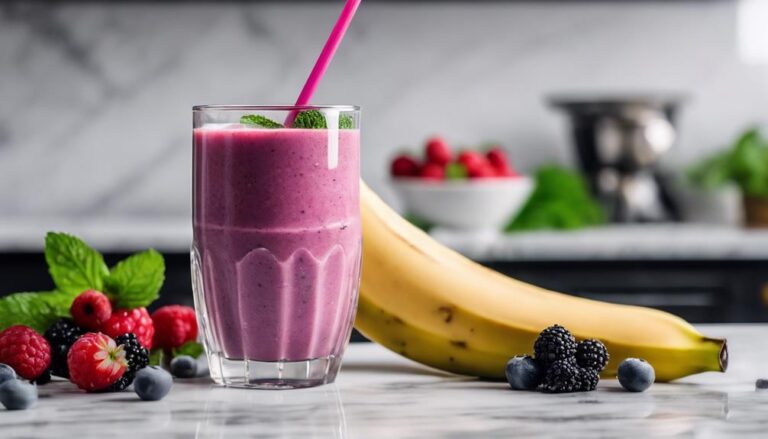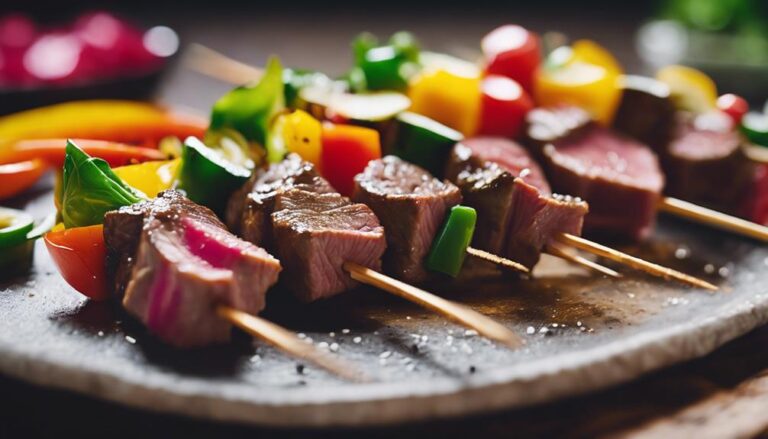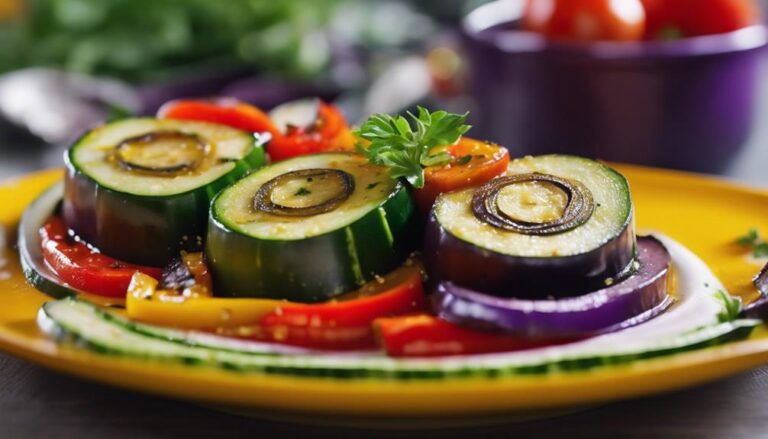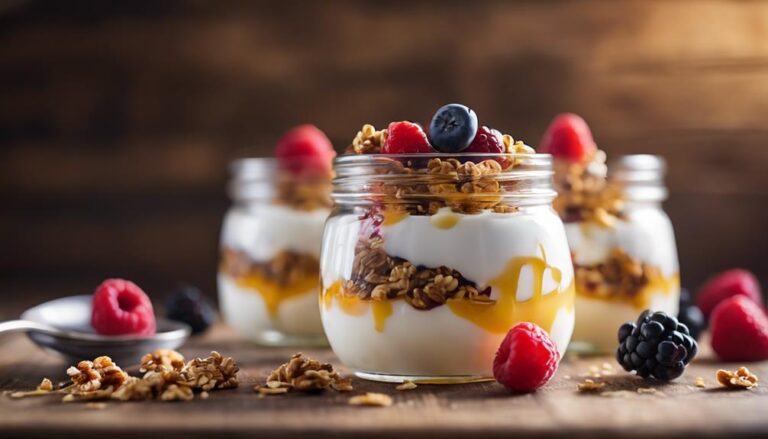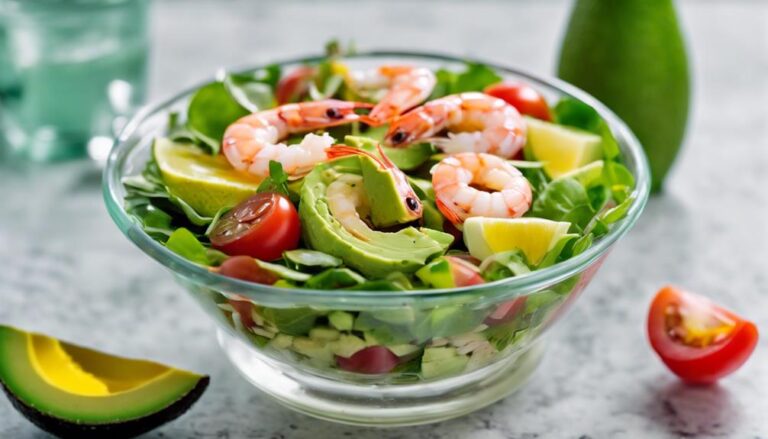Sous Vide Hard-Boiled Eggs: A Protein-Packed Military Diet Snack
Want a protein-packed snack fit for your military diet? Sous vide hard-boiled eggs are a top choice. This cooking method keeps nutrients intact, ensuring a consistent snack packed with high-quality protein, essential vitamins, and minerals. Immerse yourself in a nutrient-dense treat that aligns perfectly with your protein goals. Boost your diet efficiency by incorporating these protein-rich eggs into your routine. Uncover the secrets behind these perfectly cooked, protein-packed snacks.
What You Will Learn Here
- Sous vide ensures precise cooking for consistent hard-boiled eggs.
- Hard-boiled eggs are rich in protein, ideal for a military diet.
- Enjoy nutrient-dense snacks with essential vitamins and minerals.
- Convenient snack choice offering high-quality protein.
- Sous vide method simplifies egg preparation for dietary needs.
Egg Preservation Techniques
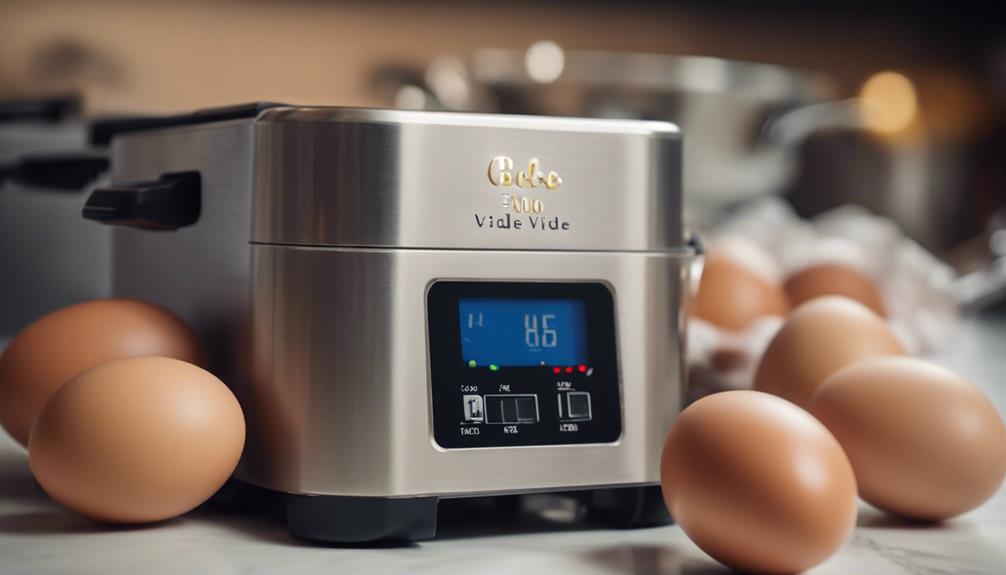
When it comes to egg preservation techniques, there are a few effective methods you can use.
Vacuum sealing your eggs can help maintain their freshness for a longer period.
Pickling is another great option for preserving eggs, adding a unique flavor profile.
Freezing eggs can also extend their shelf life, allowing you to enjoy them later on.
Vacuum Sealing Benefits
Consider vacuum sealing as a beneficial method for preserving eggs. Sous Vide benefits greatly from vacuum sealing techniques. Vacuum sealing not only helps in sealing the freshness of the eggs but also extends their longevity. By removing the air from the storage bag, vacuum sealing creates an oxygen-free environment that inhibits bacterial growth and prevents spoilage, maintaining the eggs' quality for longer periods.
When vacuum sealing eggs, it's essential to follow some tips for best results. Guarantee the eggs are hard-boiled before sealing to avoid any potential issues. Place the eggs in a single layer within the vacuum-sealed bag to prevent them from sticking together. Additionally, make sure to seal the bags properly to maintain the vacuum seal integrity.
The benefits of vacuum sealing eggs go beyond just preservation. It also helps in organizing your food storage efficiently, saving space in your refrigerator or pantry. Whether you're meal prepping, storing leftovers, or preserving eggs for later use, vacuum sealing is a practical and convenient solution for keeping your eggs fresh and ready to enjoy.
Pickling for Preservation
To extend the shelf life of eggs further, explore pickling as a preservation technique that adds flavor and versatility to your egg storage options. Pickling offers numerous benefits, including flavor infusion and extended preservation. By immersing hard-boiled eggs in a brine solution of vinegar, salt, and spices, you not only enhance the taste but also create a longer-lasting product.
The fermentation process involved in pickling helps develop complex flavors, making your eggs a delightful treat.
When pickling eggs, you can experiment with different spices and seasonings to suit your preferences. Some popular choices include dill, garlic, and peppercorns, which add depth to the eggs' taste profile. The acidity of the pickling solution acts as a natural preservative, inhibiting the growth of harmful bacteria and prolonging the eggs' storage life.
Incorporating pickled eggs into your snack repertoire provides a convenient and flavorful option for quick bites or meal additions. With their unique taste and extended shelf life, pickled eggs are a valuable addition to your culinary arsenal.
Freezing for Extended Storage
For longer-term storage of eggs, freezing is a reliable preservation technique that helps maintain their quality and freshness. When freezing eggs, it's essential to crack them open, beat the yolks and whites together, and pour them into an airtight container or an ice cube tray for convenient portions. This method guarantees that the eggs freeze evenly and can be easily used in various recipes later on. Freezing tips include labeling the containers with the date to track freshness and storing them at a consistent temperature of 0°F (-18°C) for best results.
Sous vide cooking offers advantages for egg preservation, extending their shelf life while keeping them safe to consume. By using the sous vide technique before freezing, you can optimize that the eggs are pasteurized and free from harmful bacteria, making them suitable for long-term storage. This method not only maintains the integrity of the eggs but also allows you to enjoy their nutritional benefits even after extended periods in the freezer.
Egg Freshness Levels
Guarantee the freshness of your eggs before preparing them for sous vide hard-boiled eggs to achieve the best results. Ensuring your eggs are fresh is essential for both safety and taste. Here are some tips to help you determine the freshness of your eggs:
- Egg Shelf Life: Check the expiration date on the carton. Fresher eggs are necessary for the perfect hard-boiled egg texture.
- Cracking Eggs: Crack your eggs into a bowl before cooking. Fresh eggs will have a firm white and a tall yolk, while older eggs will have flatter yolks and runnier whites.
- The Float Test: Place your eggs in a bowl of water – fresh eggs will sink, while older eggs will float due to the air pocket inside expanding as the egg ages.
- Smell Check: Fresh eggs have little to no odor when cracked open. If your eggs have a strong sulfur smell, they may not be fresh.
Sous Vide Egg Variations
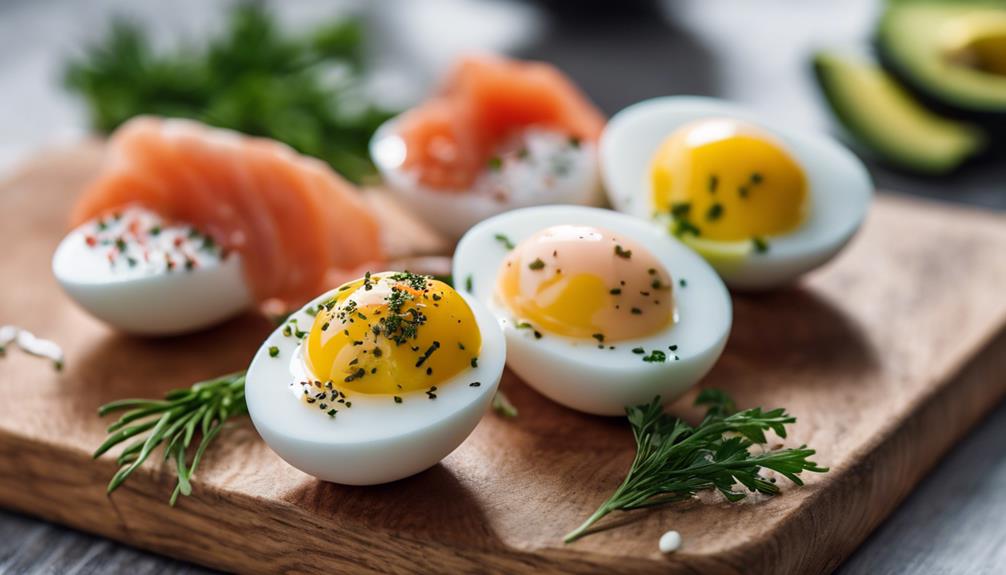
You can elevate your sous vide egg game by incorporating variations like Sous Vide Egg Salad.
This delightful dish combines the tenderness of sous vide eggs with the freshness of greens and a flavorful dressing.
It's a versatile option that can be enjoyed as a light meal or a side dish for added depth to your culinary repertoire.
Sous Vide Egg Salad
Consider incorporating perfectly cooked sous vide eggs into your favorite egg salad recipe for a delightful twist on this classic dish.
Here are some creative ways to elevate your sous vide egg salad:
- Add Crunch: Enhance texture by mixing in finely chopped celery or water chestnuts.
- Spice it Up: Experiment with different seasonings like paprika, cayenne pepper, or a touch of curry powder for a flavorful kick.
- Incorporate Fresh Herbs: Elevate the freshness by tossing in chopped dill, chives, or parsley for a burst of flavor.
- Creamy Avocado: For a healthier twist, substitute some or all of the mayonnaise with mashed avocado to add creaminess and a dose of healthy fats.
Egg Boiling Hacks
Want to make perfect hard-boiled eggs every time?
First, nail down the timing – it's essential for that ideal yolk consistency.
Second, keep an eye on temperature control; it can make or break your eggs.
Timing for Perfect Boiling
For achieving perfectly boiled eggs, accurate timing is necessary to guarantee the desired consistency. When boiling eggs, the ideal duration is around 8-10 minutes for hard-boiled eggs. Bring the water to a gentle boil, then lower the heat to maintain a steady simmer. The water temperature should be around 180-190°F (82-88°C) to cook the eggs evenly without overcooking the exterior. Confirm the water covers the eggs by at least an inch to provide consistent heat distribution. Stirring the water occasionally during the boiling process helps prevent the yolks from settling to one side and ensures even cooking.
Maintaining the water consistency throughout the boiling process is vital. Avoid rapid boiling, as it can cause the eggs to bounce around and potentially crack. Gentle agitation, like stirring the water gently, can help distribute heat evenly and prevent the eggs from cracking.
Once the eggs are cooked, transfer them to an ice bath to stop the cooking process and make peeling easier.
Temperature Control Tips
To improve your egg boiling experience and secure precise temperature control, here are some effective hacks that can elevate your cooking results.
When using sous vide for hard-boiled eggs, maintaining temperature accuracy is vital. Confirm your sous vide machine is calibrated correctly to avoid under or overcooking. Use a reliable thermometer to double-check the water temperature for accuracy.
Another helpful tip is water displacement. When placing your eggs in the sous vide water bath, make sure they're fully submerged. To prevent floating, use sous vide weights or simply add a heavy plate on top of the eggs to keep them in place. This technique secures even cooking and consistent results.
Shell Removal Tricks
Try these smart tricks to make peeling hard-boiled eggs a breeze. For enhanced peel efficiency, try the vinegar method. Simply add a splash of vinegar to the water before boiling the eggs.
The vinegar helps break down the eggshell, making it easier to peel once the eggs are cooked.
Another useful technique is rapid cooling using an ice bath. After boiling the eggs, transfer them to a bowl filled with ice water for a few minutes.
The rapid temperature change helps separate the egg white from the membrane, facilitating smoother peeling.
These two methods can notably improve your egg-peeling experience, saving you time and frustration. The vinegar method and ice bath technique are simple yet effective ways to achieve perfectly peeled hard-boiled eggs.
Experiment with these tricks to find the combination that works best for you. Whether you're meal prepping for the week or snacking on the go, easy-to-peel eggs can make your cooking experience more enjoyable.
Final Thoughts
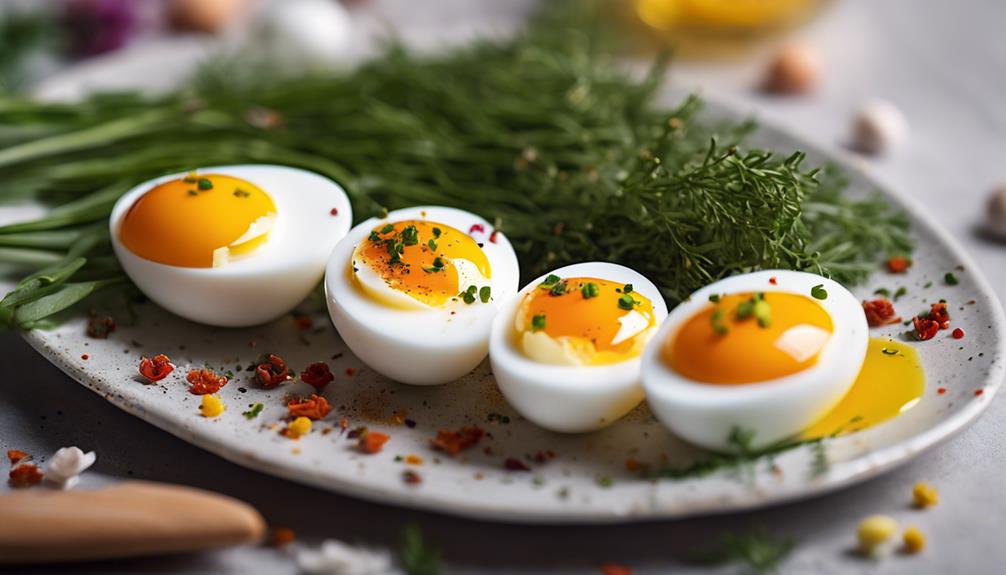
Consider these key points to wrap up your experience with sous vide hard-boiled eggs.
The sous vide recipe for hard-boiled eggs provides a convenient way to achieve consistent results every time. By cooking the eggs at a precise temperature for a set duration, you can enjoy perfectly cooked eggs without the need to monitor boiling water. This method also helps retain the eggs' nutrients, offering you a protein-packed snack that fits well into a military diet.
The nutritional benefits of hard-boiled eggs include being rich in high-quality protein, essential vitamins, and minerals necessary for your body's best function.
Frequently Asked Questions
Can Sous Vide Hard-Boiled Eggs Be Frozen for Later Use?
Yes, you can freeze sous vide hard-boiled eggs for later use. This freezing technique allows for long-term storage, maintaining the eggs' texture and taste.
However, keep in mind that freezing may slightly alter the texture compared to freshly cooked eggs. To minimize any taste changes, guarantee proper packaging to prevent freezer burn.
When ready to eat, thaw the eggs in the refrigerator before reheating or consuming.
How Can I Tell if a Hard-Boiled Egg Is Still Fresh?
To determine if a hard-boiled egg is still fresh, consider its storage and expiration. Check for quality indicators like appearance. A fresh egg typically has a smooth, unblemished shell. If the egg smells off or the shell is cracked, it might be past its prime.
Also, when cracked open, a fresh egg's yolk and white should appear firm and not runny. Always practice proper egg storage to maintain freshness and safety.
What Other Seasonings Can Be Added to Sous Vide Eggs?
To enhance your sous vide eggs, consider experimenting with various flavor combinations and cooking techniques.
Try adding herbs like chives or dill, or spices such as paprika or chili flakes for a kick.
You can also infuse oils like truffle or garlic to elevate the taste.
Experiment with different temperatures and times to achieve the desired texture and consistency.
These small additions can transform your sous vide eggs into a flavorful culinary experience.
Any Tips for Peeling Sous Vide Hard-Boiled Eggs Easily?
To peel sous vide hard-boiled eggs easily, start by cooling them in an ice bath after cooking.
Gently tap the egg on a hard surface to crack the shell all over.
Roll it between your hands to loosen the shell.
Then, begin peeling from the wider end, where the air pocket is located.
Under running water, peel the egg to help remove the shell fragments.
Store peeled eggs in the fridge for up to a week.
Can Sous Vide Eggs Be Incorporated Into Other Recipes Besides Snacking?
You can use sous vide eggs in various recipes beyond snacking. Try making a flavorful sous vide egg salad by mixing diced eggs with mayonnaise and seasonings.
For a breakfast twist, bake delicious sous vide egg muffins with veggies and cheese. These versatile eggs add a protein boost to your meals and can be incorporated into different dishes to elevate their taste and nutritional value.
Enjoy experimenting in the kitchen with sous vide eggs!
Conclusion
To sum up, sous vide hard-boiled eggs are a convenient and protein-packed snack option for those following a military diet.
By utilizing this cooking method, you can achieve consistent results with perfectly cooked eggs every time.
Experiment with different variations to find your preferred texture and flavor.
With the right techniques and a little practice, you can enjoy delicious and nutritious hard-boiled eggs as a satisfying snack or meal addition.
